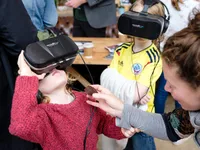Press Releases
Online museum exhibitions will be more prominent post COVID-19
When Museums closed their doors in March 2020 for the first COVID-19 lockdown in the UK a majority moved their activities online to keep their audiences interested. Researchers from WMG, University of Warwick have worked with OUMNH, to analyse the success of the exhibitions, and say the way Museums operate will change forever.
Using phage to discover new antifreeze proteins
Controlling, and mitigating the effects of ice growth is crucial to protect infrastructure, help preserve frozen cells and to enhance texture of frozen foods. An international collaboration of Warwick Scientists working with researchers from Switzerland have used a phage display platform to discover new, small, peptides which function like larger antifreeze proteins. This presents a route to new, easier to synthesise, cryoprotectants.
University of Warwick mobilises people to find the sound of Coventry in year-long festival to Resonate with City of Culture
 Finding the future sound of Coventry is just one event in a newly launched year-long festival announced today, Monday 10th May 2021 to Resonate with Coventry’s year as City of Culture.
Finding the future sound of Coventry is just one event in a newly launched year-long festival announced today, Monday 10th May 2021 to Resonate with Coventry’s year as City of Culture.
Research Software Engineer’s project to create more sustainable research software
An EPSRC Research Software Engineer Fellowship has been awarded to Dr Heather Turner, from the Department of Statistics at the University of Warwick, in which she will establish the role of Research Software Engineers in creating more sustainable and inclusive large-scale software projects.
Bhattacharyya Award for university/industry collaboration opens for entries
WMG, at the University of Warwick and The Royal Academy of Engineering are inviting entries for a new annual award to celebrate collaboration between UK academics and industry. With a cash prize of £25,000, the Bhattacharyya Award will be presented to the team who best demonstrate how industry and universities can work together. Entries must be submitted by 31 May 2021.
Smart dielectric elastomers for self-healing soft robots
Robots that resemble organs are known as soft robots, and in order for them to function they must be made of a flexible material, however a material that can also heal itself would be a bonus if wear and tear was to occur. Researchers from WMG, University of Warwick have designed a self-healing polymers for such devices.
